Chat vs Search
Think like a marketer: Will users prefer to chat instead of search?
So far, 2025 has already been littered with posts questioning the value of investing in SEO in the new world of AI, where answers are provided directly. I want to offer a more optimistic perspective on the SEO industry’s future. As we’re SEO e-commerce specialists, I’ll focus on the commerce aspect of search, though my insights apply to the SEO industry.
Chat engines vs Search engines
The challenge is that ChatGPT has become synonymous with AI. But AI is everywhere, way beyond just search and ChatGPT. From a user’s perspective, AI tools like ChatGPT, Perplexity, Gemini, etc., are essentially chatbots — albeit revolutionary ones. Users experience them through a chat interface.
So the question isn’t “Is AI killing SEO?” We should ask,
“Will users prefer to chat instead of search?”
It’s a complex question. Today’s answer is “sometimes” — or the classic SEO response: “It depends.” Throughout this post, I’ll refer to them as Chat engines (ChatGPT, Perplexity, Claude, Gemini) and Search engines (Google, Bing, Pinterest).
Chat-Engines Dominate In Top-Of-Funnel Research
The chat experience wins at the top of the funnel, where users want information and research.
People prefer the chat experience, highlighted by the rapid rise in chat-based AI tools, for their information needs. As a result, it’s natural that top-of-funnel-type searches on search engines will decline as people opt for a designated chat engine.
It seems like Google isn’t sure yet whether users want this chat experience from Google Search or whether they prefer a dedicated chat engine (in Google’s instance, this is Gemini), hence the strange hybrid experience we have at the start of 2025, which is AI Overviews within search not adding much value compared to a chat experience. Yet despite this poor experience, Google announced that over six months, the volume of searches with five or more words grew 1.5 times faster than shorter queries, signalling how users’ needs are becoming more specific from using chat engines. It appears that users are starting to use Google search more like a chat engine — but that’s what Gemini is for.
I recently wrote about the new Google Shopping launched in the U.S.; if Google can make the Shopping tabs a destination, like Maps or Images, then that leaves the main search page more chat-like, achieving a chat and search experience under the Google umbrella.
The chat engines win at this stage of the funnel; however, it is very difficult to monetize. These chat engines are expensive — ChatGPT reportedly costs over $700,000 a day to operate. CNBC reports that a ChatGPT query uses 10 times the energy a Google search does. Chat engines need to monetize.
In November, Perplexity launched a CPM advertising model for this funnel stage. It’s an interesting move, but to get marketers on board, they must offer tracking to prove ROI. Even Google has not tried to monetise these information searches, and the value of the traffic is questionable from a commercial perspective, but time will tell.
For ChatGPT, why launch a search engine if they don’t intend to monetise through targeted ads? It’s also a proven revenue model.
Where Search Still Wins
The chat experience struggles in the middle and bottom of the funnel. So ChatGPT announced its search engine, and Perplexity references itself as ‘the future of search’ in its welcome email. This stage of the funnel is where Google Search continues to shine. Google has over 25 years of experience and data, and these platforms will take a long time to catch up.
A recent study reminds us that these Chat Engines are bots just like Search Engines and don’t have Google’s crawling capabilities. Their bots are Google from 5+ years ago; they struggle to process and read modern websites. If a website doesn’t adopt server-side rendering, it’s not getting found by Chat Engines.
Both of these points highlight the need for SEO. As we’ve done for many years, our job is to make websites accessible and user-friendly for these bots.
We’re looking at a world where Google searches decline, but the shopping and comparison experience doesn’t. We could very well end up with multiple new search engines, all with their own nuances that need to be tackled. This doesn’t diminish SEO, if anything, it increases its importance.
I can’t see an AI Chatbot completely replacing the shopping experience. A study by Intellias found that 71% of respondents agreed that a blend of AI automation and human interaction would always be when shopping, regardless of how advanced AI technology becomes.
Shopping And Discovery — Human Behaviour.
People don’t just buy products — they often enjoy discovering and selecting them.
This innate desire for autonomy drives us to make our own choices, a core idea in self-determination theory. Shopping fulfils our need to explore and decide. When we browse and compare options, we gain control that automated recommendations cannot provide. Though chatbots may offer convenience, many consumers naturally gravitate toward searching and comparing products. The journey of discovery is fundamental to the online and offline shopping experience.
The search engine wins when it comes to the middle and bottom of the funnel. If information searches decline, the Google landscape could become even more commercially competitive, raising CPCs even more and creating a greater need for SEO professionals to help acquire organic traffic and reduce reliance on paid media.
While blogs — a significant part of the SEO toolkit — may decline in importance, this shift could be offset by the emergence of new search engines, each with unique requirements. Though the depth of traditional Google SEO work might decrease, it would be balanced by the need for broader expertise across various search and chat platforms.
SEO Isn’t Going Anywhere, But We Must Adapt
For SEO to die, two things must happen: Users must abandon search engines for chat engines, and marketers must see ROI to shift budgets accordingly. Shifting marketer mindsets takes time. However, the more significant challenge is changing human behaviour, as it’s typically the slowest and most complex transformation. In short, SEO professionals aren’t going anywhere anytime soon, but we need to adapt, as always.




